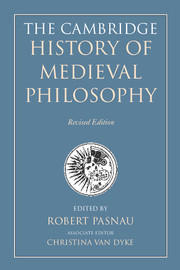Book contents
- Frontmatter
- Contents of Volume 1
- Preface
- List of contributors
- Frontmatter
- Contents of Volume 2
- Introduction
- I Fundamentals
- II Logic and language
- III Natural philosophy
- IV Soul and knowledge
- V Will and desire
- VI Ethics
- VII Political philosophy
- VIII Metaphysics
- 44 The subject of the aristotelian science of metaphysics
- 45 Essence and existence
- 46 Form and matter
- 47 Realism
- 48 Nominalism in the later middle ages∗
- 49 Accidents and modes
- IX Theology
- Appendices
- Bibliography of primary sources
- Bibliography of secondary sources
- Index nominum
- Index rerum
- References
47 - Realism
from VIII - Metaphysics
Published online by Cambridge University Press: 05 August 2014
- Frontmatter
- Contents of Volume 1
- Preface
- List of contributors
- Frontmatter
- Contents of Volume 2
- Introduction
- I Fundamentals
- II Logic and language
- III Natural philosophy
- IV Soul and knowledge
- V Will and desire
- VI Ethics
- VII Political philosophy
- VIII Metaphysics
- 44 The subject of the aristotelian science of metaphysics
- 45 Essence and existence
- 46 Form and matter
- 47 Realism
- 48 Nominalism in the later middle ages∗
- 49 Accidents and modes
- IX Theology
- Appendices
- Bibliography of primary sources
- Bibliography of secondary sources
- Index nominum
- Index rerum
- References
Summary
Realism and nominalism were the two major theoretical alternatives in the later Middle Ages concerning the reality of general objects: realists believed in the extramental existence of common natures or essences; nominalists did not. This so-called “problem of universals” was only one of the main questions at issue between realists and nominalists, however, whose disputes ranged widely over the status and mutual relationships of the basic items of the world (individual and universal substances, individual and universal accidents) as well as their connection to language. For scholastic authors, these questions arose first and foremost in the context of Aristotle’s Categories. As a consequence, the medieval realist–nominalist dispute included also the problem of the status and number of real categories. Realists held that the division into categories is first of all a partition of things made on the basis of ontological criteria and only secondarily a classification of terms (which could be mental, written, or spoken), and therefore that the world is divided into ten fundamental kinds of things (in a broad sense of ‘thing’), no one of which can be reduced to any other. In contrast, nominalists maintained that Aristotle’s division into ten categories is a partition of terms on the basis of semantic criteria, and that there are only two or three real categories (Substance and Quality, and perhaps Quantity too). Even though from a purely logical point of view these opinions on categories and universals are independent of each other, historically, in the later Middle Ages, realism concerning categories was always matched by a realistic conception of universals, whereas nominalism on the question of categories was always paralleled by a nominalistic position on universals.
- Type
- Chapter
- Information
- The Cambridge History of Medieval Philosophy , pp. 647 - 660Publisher: Cambridge University PressPrint publication year: 2014
References
- 1
- Cited by



